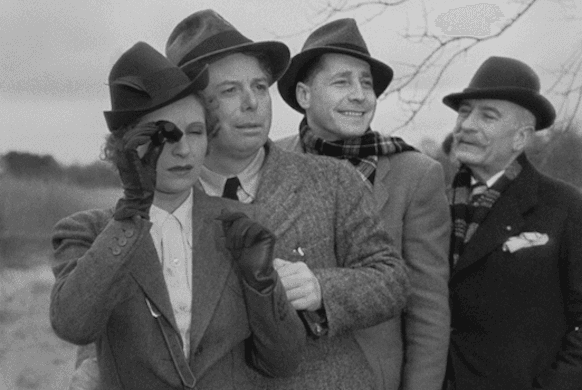Reappraising Renoir’s ‘Rules of the Game’
Long considered one of the classics of cinema, the 1939 release at one time was anything but highly esteemed, being banned by the French government and the Nazis. Its very survival was even in doubt.

Quite the kerfuffle, the response to Sight & Sound magazine’s recent listing of the “Greatest Films of All Time.” Ten years ago, this erstwhile organ of the British Film Institute caused ripples when “Vertigo” replaced the seemingly indomitable “Citizen Kane” in the vaunted no. 1 spot. Now we have “Jeanne Dielman, 23 Quai du Commerce, 1080 Bruxelles” topping the chart, a designation that has prompted a veritable tsunami of controversy.
Tastes fluctuate, of course, and if this decade’s summum of the cinematic arts is indicative of our hyper-politicized movie commentariat, well, this too shall pass. For my money, the three-plus hours of Chantal Akerman’s newly knighted masterwork would be better spent watching “Daughters of Darkness,” the cult favorite in which Delphine Seyrig, the star of “Jeanne Dielman,” plays a descendant of Elizabeth Báthory, the legendary Hungarian noblewoman responsible for the slaughter of countless girls and women. Better lurid sensationalism than Marxist condescension any day of the week, I say.
The IFC Center has mounted a program based on the Sight and Sound poll, giving New Yorkers a chance to catch up with “Jeanne Dielman,” “Vertigo,” “Beau Travail,” and, as it is advertised, “more to come.” Situated a few blocks away in Manhattan, Film Forum is hosting a revival not only of “The Trial” — which did not, for what it’s worth, make the magazine’s cut — but of “The Rules of the Game,” which came in at no. 13. Jean Renoir’s comedy of manners has occupied a prominent place on the list since its inception.
The film’s upcoming week-long engagement offers a welcome opportunity to reappraise Renoir’s jaundiced take on the prerogatives, romantic and otherwise, of the haute bourgeoisie. The picture wasn’t always highly esteemed. Upon its release in 1939, “The Rules of the Game” was subject to more slings and arrows than its maker could have imagined. Renoir “was utterly dumbfounded when it became apparent that the film, which I wanted to be a pleasant one, rubbed most people the wrong way.” One patron went so far as to attempt setting fire to the theater in which the film had its premiere.
Context counts for something here. War in Europe was in the cards. Tensions in Paris were on the rise. Whether one was sympathetic to National Socialism or a member of the Popular Front, audiences weren’t inclined to view kindly a satiric take on upper-class privilege, working-class ambition, and getting away with murder. Considered demoralizing, “The Rules of the Game” was banned by the French government. The Nazis continued the ban under their occupation of France, and then the negative was destroyed during the war.
Bits and pieces of “The Rules of the Game” were subsequently discovered and put together, the restored version being a highlight of the 1959 Venice Film Festival. In a short documentary clip recorded soon thereafter — it can be found on YouTube — the cherubic director talks of how he had intended to make an agreeable film that was, nonetheless, “a critique of a society I considered rotten to the core and which I still consider rotten to the core.” Renoir was not one to mince words.
At this date, the picture doesn’t speak truth to power so much as illustrate hypocrisies that seem fairly preordained. Not quite a farce and not quite a drama, Renoir’s Byzantine tale of love taken lightly can’t help but feel trivial compared to the existential fundamentals laid out in “The Grand Illusion” or the homespun gravity of “The Southerner,” the best of Renoir’s Hollywood pictures.
Still, it’s “The Rules of the Game” that made the mark, and the film continues to be winsome enough to make it worth mooting one more time.

